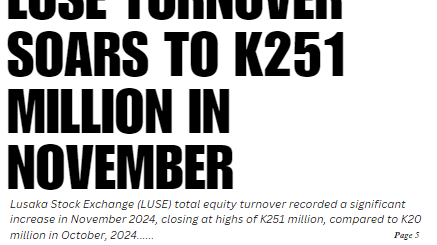FNB Zambia Launches Solar Transition Project to Address Power Crisis
First National Bank (FNB) Zambia has launched a comprehensive solar transition project to address the ongoing energy crisis in the country.
Bank Chief Executive Officer, Kapumpe Chola said the financial institution is transitioning its branches to solar power across the country, beginning with three sites, which include two in Lusaka and one in Mkushi, while identifying five more locations for implementation in the near future.
Ms. Chola stated that the transition is about ensuring business continuity and being part of the solution in Zambia’s energy space.
She explained that as energy disruptions continue to impact various sectors, the commercial Bank is prioritizing reliable power solutions to maintain high service standards for its clients.
“The solar project, which will also incorporate genset installations at some branches, is designed to strengthen the bank’s operational resilience, ensuring that FNBZ branches remain accessible and operational even during power outages.”
“Our decision to invest in solar energy is both a strategic and responsible approach to the current energy challenges. As a leading financial institution, it is imperative that we offer our clients consistent service at all times. This transition is part of our broader commitment to sustainable practices and operational efficiency,” Ms. Chola stated.
Ms. Chola added that the bank’s journey began with solar installations at its Kalumbila branch in North-Western Province.
“Since then, three branches: Lusaka Private Suite, Kabulonga Branch, Mkushi Branch have been completed. Kabwe Branch, Kitwe Private Suite, and Choma Branch are the sites expected to be operational in the coming weeks.”
“The next phase will focus on five additional sites, including Livingstone and the FNB Head Office, where space constraints and logistical considerations are being actively managed to accommodate the new infrastructure. Genset installations are also being prioritized at key locations to complement the solar systems and provide a robust energy backup,” she added.
Ms. Chola further said the Bank is taking a collaborative approach with landlords to find mutually beneficial solutions that will not compromise building integrity.
“FNB’s efforts to transition to solar have not been without challenges, particularly with building landlords who are increasingly overwhelmed by tenant demands for solar structures.”
“The bank is committed to keeping clients and stakeholders updated on the progress of this project through regular communication and public updates,” Ms. Chola said.
According to the Bank, the transition is expected to significantly reduce its dependency on the national power grid, providing a long-term solution to energy disruptions while aligning with global sustainability trends.








